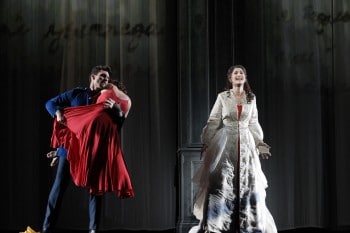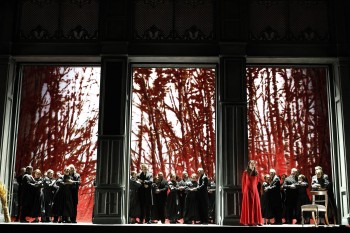Opera Australia: Eugene Onegin
Standing out like a jewel amidst the usual fare of Verdi, Bizet and Donizetti at Opera Australia’s Autumn Melbourne season is Tchaikovsky’s rarely performed Eugene Onegin. Directed by Danish opera director Kasper Holten, Artistic Director of Royal Opera House, Covent Garden, and first performed at Covent Garden in 2013, this stylish production is matched by top-notch singing and affirms the rising-star status of young Australian soprano Nicole Car.

The publicity says: “A young girl’s first love goes unrequited, charting a course from hope to regret with tragic consequences along the way.” And the story is such but so much more. The libretto, drawn from a verse novel written by Pushkin in 1831, is shaped as a memory – the characters Eugene Onegin and Tatyana, reunited after many years, rediscover their passion for one another, but time and circumstance make their love impossible. Through a series of scenes, characteristically Russian flavoured with melancholy and melodrama, we see the train of events that lead to this conclusion. Passion, duty and fate exert equal influence on the characters andv even though there are tragic consequences, for modern audiences Tatyana’s fate doesn’t seem all that bad. If she had ended up with the self-absorbed Onegin, that would be a tragedy!
To assist in his directive slant on the subjective nature of memory, Holten has added two dancers to the work, who effectively act out Onegin’s and Tatyana’s memories. The premise works to a degree, particularly when the older (singer) characters interact with their remembered selves, but it is often confusing, and in this run the singers are such accomplished actors that the dancing looks redundant.
This is really the only negative in an otherwise visually sumptuous and dramatically satisfying production. The design by Mia Stensgaard (set) and Katrina Lindsay (costume) is simple but elegant, painting a clear distinction between the greyness of Tatyana’s country life and the colourful rural exterior – only Tatyana, her sister Olga and Onegin wear colour, and in the later scenes Tatyana’s red gown is shrouded in grey while her new home is surrounded by solid wood panelling. Side lighting is used to throw shadows, stillness is used with great effect, and there are a number of memorable, evocative images. The scene 5 ball, where the heartbroken Tatyana is surrounded by a nightmarish horde, is one example of direction that lifts the opera from a melodramatic tale of love and loss into the realm of psychological drama.

For the Melbourne season, OA have assembled a cast of mostly Australian singers.
Nicole Car is without doubt the best Australian soprano that I have seen in many years – a true lyric with warm strength across her entire range capped off with a ringing upper register. As Tatyana she communicates a thoughtful and sensitive sensibility, coupled with an assured physical presence.
As Onegin, Brazilian born baritone Paolo Szot is appropriately handsome and a fine actor, but on opening night betrayed signs of a tired voice. James Egglestone (Lensky), a pleasing but lighter tenor not ideally suited to this repertoire, is however entirely convincing in the demanding role, never missing a note or a beat. Sian Pendry (Olga), Jacqueline Dark (Filippyevna) and Dominica Matthews (Madame Larina) all impress with their mastery of the darker, biting vocal timbre required by this Russian opera. And there’s Daniel Somegi (Prince Gremin) and it’s a privilege to hear this world class bass in a role that could have been written just for him.
In the pit, under the baton of French conductor Guillaume Tourniaire, Orchestra Victoria’s playing was near faultless. It is in operas like this (as in the recent Ring Cycle), where the orchestra is so intrinsic to the integrity of the production, that the importance of a having a full-time professional orchestral ensemble in Victoria becomes glaringly obvious. If Opera Australia is committed to presenting top quality music drama in Melbourne, it is hoped the strength of their advocacy will help to ensure the survival of this excellent orchestra.

